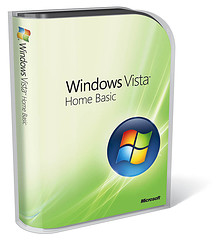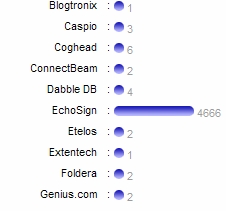(Updated)
In my longer analysis of the JotSpot sale to Google I listed a group of JotSpot customers who may feel disadvantaged by the deal: those who’d rather pay to have their data at a company whose pure business model is charging for services than enjoy free service by Google whose primary business model requires dissecting/analyzing their data left and right.
I also pointed out that several competitors are offering deals to migrate these customers to their platform free or at a discount. Socialtext and Atlassian were the first to come forward with their offers, but since the previous post I heard about Central Desktop, (update: see correction in this comment by Central Desktop’s CEO), ProjectForum and I’m sure there are others. (Clearly, the wiki market is growing and sadly, I don’t know all the players). Jerry Bowles and Tom Raftery wrote more on the subject.
We all seem to have missed a point here: there is a group of customers for whom migration is not optional but a necessity: participants in the JotSpot Wiki Server beta program. Like I’ve said before, as much as I am a SaaS believer, it is not a religion, apparently the feedback from most customers is that they want their wiki behind the firewall – JotSpot’s response was the Wiki Server edition. These customers now have a rude awakening: JotSpot notified them that they would discontinue the beta program. Current customers have the right to continue using the product for the remainder of the 90-day beta period (what’s the point?  ) but there is no support, no migration plan – game over, bad luck.
) but there is no support, no migration plan – game over, bad luck.  Of course JotSpot had the right to do this, these were not paying customers (yet), and a beta is a beta, after all. But a beta program is a mutual effort, and especially early on requires a lot of time and effort from the customers, so it’s clear that these customers may feel let down. While most competitive migration offers are hosted solutions, it’s this specific “betrayed” group that Atlassian goes after: they offer migration help and discounted rates on Confluence, their behind-the-firewall enterprise wiki. So let down or not, these customers may eventually be better off on a more mature, robust enterprise platform.
Of course JotSpot had the right to do this, these were not paying customers (yet), and a beta is a beta, after all. But a beta program is a mutual effort, and especially early on requires a lot of time and effort from the customers, so it’s clear that these customers may feel let down. While most competitive migration offers are hosted solutions, it’s this specific “betrayed” group that Atlassian goes after: they offer migration help and discounted rates on Confluence, their behind-the-firewall enterprise wiki. So let down or not, these customers may eventually be better off on a more mature, robust enterprise platform.
As a sidenote, this is the second time that JotSpot drops a product benefiting a competitor: when they discontinued JotBox, Socialtext reaped the benefits by moving those customers to their Appliance. Update: Please read the comment exchange below for correction by JotSpot.
Update (11/29): two post on how the deal affected JotSpot partners and customers:
JotSpot Got the Goldmine. Its Partners and Customers Got the Shaft.
The JotSpot Google Merger
Update (11/30) the above post, The JotSpot Google Merger is now deleted, supposedly under pressure by … (?) Read the story on TechCrunch.

 )
)
 … but Joe Kraus, having sold Jot$pot to Google. The source was credible but of course we had already heard about a Yahoo acquisition, then eBay .. so who knows, after all.
… but Joe Kraus, having sold Jot$pot to Google. The source was credible but of course we had already heard about a Yahoo acquisition, then eBay .. so who knows, after all. – now let’s look at what Google should do with JotSpot.
– now let’s look at what Google should do with JotSpot.





 EchoSign
EchoSign
Recent Comments